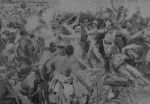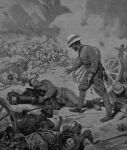 1 March 1896 - marking the end of the first phase of Italian colonialism.
1 March 1896 - marking the end of the first phase of Italian colonialism.
Unlike the defeat at Caporetto which was forgotten about after a few months, the defeat at Adwa - in the Tigray region of Ethiopia - on 1 March 1896, rankled for forty years. It rankled until Italian troops reclaimed it on 6 October 1935 during the Fascist invasion of Ethiopia. However, this victory was short-lived as the English reoccupied the city five years later in April 1941. Defeat was to be expected in 1896. The Italian army had been sent in at the deep end with notably inferior forces and under the command of a dispirited commanding officer. 289 officers and 4 thousand soldiers were killed, in addition to 1,000 Eritrean askaris. Not to mention 1,500 wounded and 1,900 prisoners. As regards the prisoners, their memoirs (an unpublished example of which is provided below) confirms the very humane treatment meted out to them after they underwent a long march. By the end, many had managed to win the respect of their prison guards and had close relationships with local women. Menelik even organised a farewell luncheon for the officers. Within a year, all were freed after the peace treaty was made – however, this was in exchange for a huge ransom paid by our government (10 million lire).
 113 YEARS AFTER THE BATTLE OF ADWA - by Gabriele Battaglia -
113 YEARS AFTER THE BATTLE OF ADWA - by Gabriele Battaglia -
One day I found a tin box in the attic amongst various knickknacks and rummaged around inside it: old yellowed photographs, a few picture postcards, some medals, a small prayer book. In addition to some carefully folded sheets from a squared exercise book. These caught my interest immediately: lettersfrom my maternal grandfather, dating from August 1896. I knew that my grandfather had taken part in the African campaign at that time, but had never have imagined finding anything to document his military exploits. My grandfather Amedeo was born in Stienta in the province of Rovigo on 2 March 1873, the oldest of nine born to Carlo Cavriani and Luigia Mastella. Even though I looked hard, I couldn’t find anything on his life until the day he was called up for service as a 1st category soldier on 7 December 1894. On 18 December 1894 he was assigned to the 2nd artillery regiment and on 28 February 1895, to the 5th artillery regiment. One year later, on 5 February 1896, he formed part of the troops leaving for Africa with a mountain battery. Just 22 days after leaving Italy, my grandfather’s contingent had reached Adwa, in Abyssinia, and prepared to do battle to conquer Ethiopian territory and increase the African colonies. The battle was held on 1 March 1896, and was difficult and bloody. It ended with a resounding, humiliating defeat for the Ita lian expeditionary forces. Almost 2,000 prisoners were taken by Menelik’s men, and one of these was my grandfather, Amedeo. He wrote his first letter five months after the battle: Dear Mum and Dad, […] We still hadn’t finished carrying all the equipment when a crowd of Abyssinians came over the hill and started to fire at us. The shots arrived like hail during a vicious summer storm. The enemy troops vastly outnumbered ours, so the Italian troops had to retreat quickly. Our captain said to us: “Lads, let’s try and save ourselves, escape if you can!” So we left the mules and cannons and tried to escape. We crossed an entire valley and all the Italian troops gathered on top of a small hill, and the enemy stopped firing. The Italians started to raise the flag and shouted “long live Italy and long live Baratieri”.When the enemy heard these words it began to fire again [...]. At some stage, I saw a black man coming towards me with a gun pointed at me. So I got down on my knees and began to pray to the Lord. He came up to me but didn’t do me any harm, he indicated that I should get up and follow him. I got to my feet and followed him. I was continually expecting some treachery but he just brought me very respectfully to Menelik’s camp. Then we were held in Massaua for 5 days. After 5 days we began walking towards Sioa and we kept walking for 2 months. Our food was always roasted: barley, beans, peas, chick peas and sunflower seeds [...]. We arrived in Cntoto when God so willed. [...] So I am not suffering at all where I am. We eat meat, everything[...] This was the simple account of my grandfather’s experience at the battle of Adwa, and the beginning of the time he spent as a prisoner in Abyssinia. He was a 23 year-old soldier and had trained for exactly 14 months as an artilleryman, but had not once shot a cannon. And he wasn’t armed when theAbyssinian pointed his gun at him. This had in fact actually
lian expeditionary forces. Almost 2,000 prisoners were taken by Menelik’s men, and one of these was my grandfather, Amedeo. He wrote his first letter five months after the battle: Dear Mum and Dad, […] We still hadn’t finished carrying all the equipment when a crowd of Abyssinians came over the hill and started to fire at us. The shots arrived like hail during a vicious summer storm. The enemy troops vastly outnumbered ours, so the Italian troops had to retreat quickly. Our captain said to us: “Lads, let’s try and save ourselves, escape if you can!” So we left the mules and cannons and tried to escape. We crossed an entire valley and all the Italian troops gathered on top of a small hill, and the enemy stopped firing. The Italians started to raise the flag and shouted “long live Italy and long live Baratieri”.When the enemy heard these words it began to fire again [...]. At some stage, I saw a black man coming towards me with a gun pointed at me. So I got down on my knees and began to pray to the Lord. He came up to me but didn’t do me any harm, he indicated that I should get up and follow him. I got to my feet and followed him. I was continually expecting some treachery but he just brought me very respectfully to Menelik’s camp. Then we were held in Massaua for 5 days. After 5 days we began walking towards Sioa and we kept walking for 2 months. Our food was always roasted: barley, beans, peas, chick peas and sunflower seeds [...]. We arrived in Cntoto when God so willed. [...] So I am not suffering at all where I am. We eat meat, everything[...] This was the simple account of my grandfather’s experience at the battle of Adwa, and the beginning of the time he spent as a prisoner in Abyssinia. He was a 23 year-old soldier and had trained for exactly 14 months as an artilleryman, but had not once shot a cannon. And he wasn’t armed when theAbyssinian pointed his gun at him. This had in fact actually  saved his life. However the prisoners weren’t sent to concentration camps. In such a vast and unknown country, the solution to the prisoner problem was made by allocating 10 men to each village, assigning one per family. My grandfather didn’t write about what he had to do when living with a family, but only confirmed that he was well-treated. […] The village that I am in is called Barachete. There is a mission in this village and a missionary called Padre Gioachino arrived a few days ago. So this priest met three of us Italians and invited us to his house. One fine day we left and went to meet him. He greeted us with great warmth when we arrived. He immediately had a fat sheep killed for us and we ate and drank like lords. Then he said to us: write a letter to your parents and I will make sure that the letters get to your families. And he gave us everything we needed to write the letters. Then he said: when you have finished, give the letters to me. I will send them to my parents in Spain and they will send them on to your families in Italy. So I can’t say anything else, I’ll just send my greetings, and hope that you and my uncles and aunts and
saved his life. However the prisoners weren’t sent to concentration camps. In such a vast and unknown country, the solution to the prisoner problem was made by allocating 10 men to each village, assigning one per family. My grandfather didn’t write about what he had to do when living with a family, but only confirmed that he was well-treated. […] The village that I am in is called Barachete. There is a mission in this village and a missionary called Padre Gioachino arrived a few days ago. So this priest met three of us Italians and invited us to his house. One fine day we left and went to meet him. He greeted us with great warmth when we arrived. He immediately had a fat sheep killed for us and we ate and drank like lords. Then he said to us: write a letter to your parents and I will make sure that the letters get to your families. And he gave us everything we needed to write the letters. Then he said: when you have finished, give the letters to me. I will send them to my parents in Spain and they will send them on to your families in Italy. So I can’t say anything else, I’ll just send my greetings, and hope that you and my uncles and aunts and families are all well. I can’t give you any news on whether we will be freed or not. I hope it will happen as soon as possible. [...] This sudden interruption of the silence that surrounded the fate of young Amedeo helped fuel the hope that he would return home safely after his terrible African adventure. Which is what happened on 24 May 1897, the day that his service record notes that he came back to Italy, to the 2nd artillery regiment based in Ferrara. On 28 May 1897 he was granted discharge to the reserve with a statement of good conduct dated 25 June 1897, and on 18 December 1897 the Ministry of War authorised his decoration with a medal in commemoration of the African campaign.
families are all well. I can’t give you any news on whether we will be freed or not. I hope it will happen as soon as possible. [...] This sudden interruption of the silence that surrounded the fate of young Amedeo helped fuel the hope that he would return home safely after his terrible African adventure. Which is what happened on 24 May 1897, the day that his service record notes that he came back to Italy, to the 2nd artillery regiment based in Ferrara. On 28 May 1897 he was granted discharge to the reserve with a statement of good conduct dated 25 June 1897, and on 18 December 1897 the Ministry of War authorised his decoration with a medal in commemoration of the African campaign.








